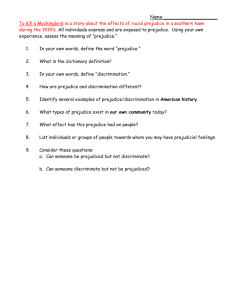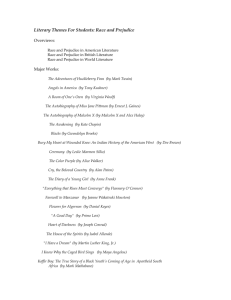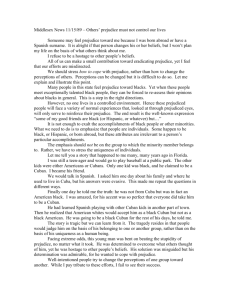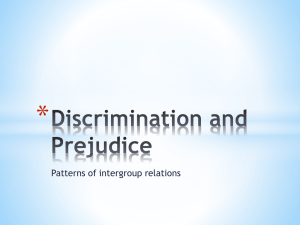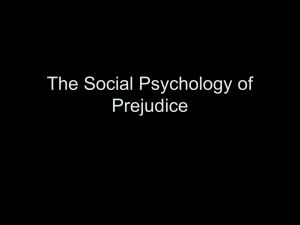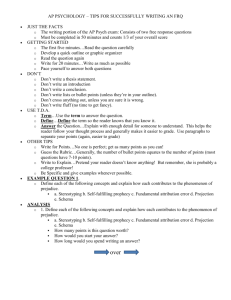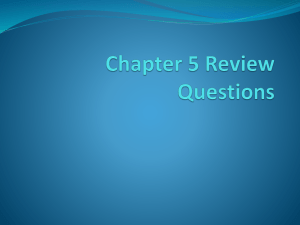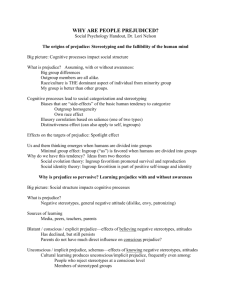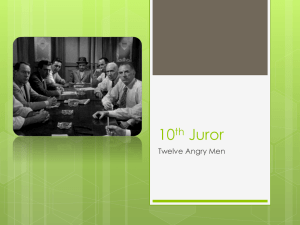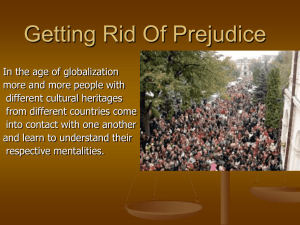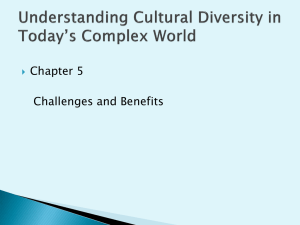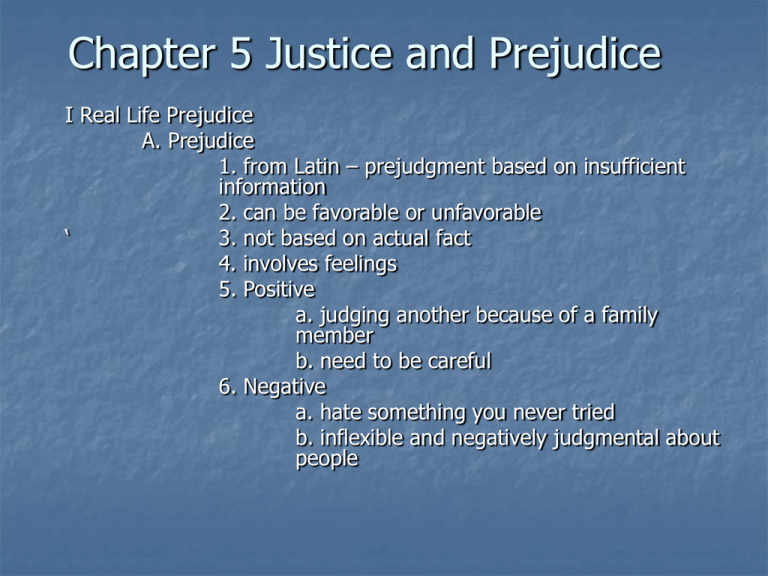
Chapter 5 Justice and Prejudice
I Real Life Prejudice
A. Prejudice
1. from Latin – prejudgment based on insufficient
information
2. can be favorable or unfavorable
‘
3. not based on actual fact
4. involves feelings
5. Positive
a. judging another because of a family
member
b. need to be careful
6. Negative
a. hate something you never tried
b. inflexible and negatively judgmental about
people
B. Negative Prejudice
1. infects people like a virus
2. result of original sin
3. by itself is sinful
4. violates the virtue of justice
5. 3 conditions that make it wrong
a. prejudice is wrong when it threatens
the rights of people or denies them their
just due
b. when it is illogical or stereotypical
1) stereotype – oversimplified
generalizations about some aspect
of reality
2) example – blonds, jocks, nerds, etc.
c. when it resists new information
6. example of a negative prejudice
a. a person with a homosexual orientation
often stereotyped in a degrading way
b. often the object of scorn, hatred,
discrimination
c. ignorance is probably the most predominant factor
d. science – no one chooses to have a homosexual
orientation – nature or nurture?
e. the orientation is not sinful
f. the activity is because it is contrary to God’s
intention for male – female bonding
g. every human being deserves respect as a child of
God
h. the fundamental rights of homosexual persons must
be defended
i. bigots are truly prejudiced people who out of pride
and stubbornness hold on to their beliefs contrary to
the evidence
II. Stages of Prejudice
A. Antilocution
1. means speaking against
2. ethnic jokes often considered a mild form
3. jokes can be vicious, cruel, degrading to the
group
4.examples – calling someone a fag or a dyke,wop
5. it can be mild but always demeaning and unChristian
6. root it out of our language and vocabulary and
challenge our friends who use it
B. Avoidance
1. go to extremes to avoid people they dislike
2. makes others feel hurt and humiliated
3. often leads to worse – like bullying
C. Discrimination
1. harmful actions against disliked persons
or groups
2. denies them their fundamental human
rights
a. denying jobs- race, sex, ethnicity, religion, age
b. excluding from neighborhoods
c. restricting educational and recreational
activities
d. excluding from churches and other social
groups
e. segregation in schools, hotels, trains, buses,
restaurants
3. sexism
a. one sex is superior to the other
b. historically men over women
c. feminism has been able to challenge patriarchy
d. examples
1) women not treated as well as men
2) much higher incidence of poverty among households
headed by women –“feminization of poverty”
3) glass ceiling effect - - being able to advance only so far
4) wages – 75% of men’s wages
5) in some countries – exclusion from the political process
6) in some countries – condemned to most menial labor
7) assaults, beatings, rape
4. ageism
a. discrimination against the elderly
b. forced to early retirement due to downsizing
c. more elderly people will be living in poverty
d. poverty rate among elderly – 10.5 % - even more
among elderly women
e. stability of Social Security and Medicare?
f.Legalize euthanasia? Unproductive and
burdensome
g. Each person has dignity as child of God
h. Older people can be a treasure for society
i. They deserve a decent home, job, health care
D. Physical Attack
1. hate crimes
2. desecrating graveyards, swastikas on
synagogues, spitting on people, vandalism
3. forcible ejection from nighborhoods, gang
violence
4. gay bashing
5. rape and sexual assault against women
6. we have right to be free from violence
E. Extermination
1. eliminating individual or whole group
2. assassinations, lynchings, massacres, terrorism, etnic
cleansing
3. 20 th century- most violent in history
4. example – Holocaust
III. Attempting to explain Prejudice
A. Why does it exist?
1. serious effect of original sin
2. people too lazy to think
3. scapegoats are an easy way to deal with negative
emotions
4. use it to deal with frustrations istead of the real
source
5. in groups are always right; out groups always
wrong and bad
6. gives people a feeling of superiority
7. it pays both psychologically and financially
B. How do people become prejudiced
1. no one is born prejudiced
2. nature vs. nurture
3. factors:
a. home is the central school for
prejudice
1) passed on by parents
2) schools, neighborhoods,
church groups often reinforce
b. sexism is a key
1) males should have more
power than girls
2) girls might stuggle with feeling
of inferiority
C. Who are prejudiced?
1. difficulty with dealing with ambiguity –
either-or
2. have low self esteem – want to feel good
about themselves
D. Overcoming prejudice
1. working with a different group at a task
on common goals
2. participating in programs where we put
self in other’s shoes
3. becoming aware of how inconsistenr it is
with one’s values and attitudes
4. establishing laws, regulations, social
norms that require fair treatment

